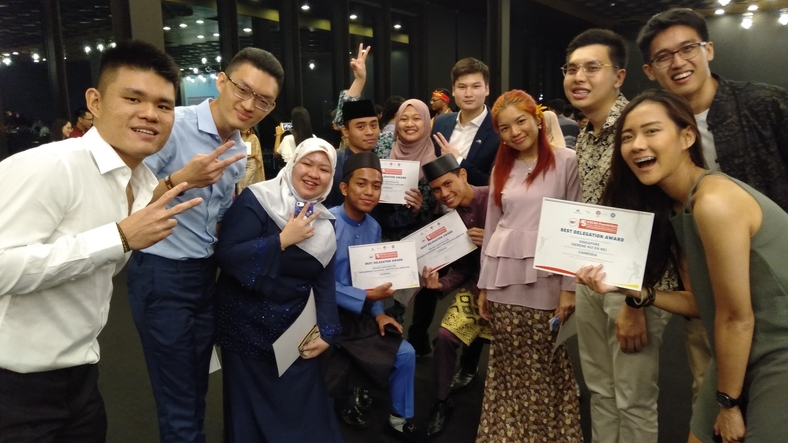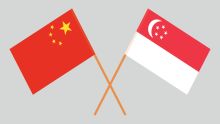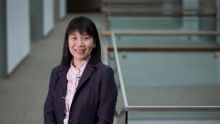Mastering collaboration and consensus at the Model ASEAN Meeting

SMU students, working with students from Brunei and Australia, were voted the Best Delegation at the 5th ASEAN Foundation Model ASEAN Meeting (AFMAM) in Bangkok
In July this year, a team of six SMU undergraduates participated in the 5th ASEAN Foundation Model ASEAN Meeting (AFMAM) held in Bangkok, Thailand.
Reflecting the diversity of SMU, the team, led by team advisor Elizabeth Su, adjunct faculty from Lee Kong Chian School of Business (LKCSB), comprised students from five out of SMU’s six schools: Kenneth Kong (Accountancy), Serene Ng (Economics), Lam Zhi Liang (Social Sciences), Tan Yan Ming (Information Systems), Russell Yap (LKCSB) and Jabez Tay (LKCSB).
AFMAM offers participants an authentic Association of Southeast Asian Nations (ASEAN) experience through realistic role play and meeting simulations. During the Model Meeting, students take on the roles of senior ASEAN officials and participate in mock meetings, which include a simulation of the ASEAN Summit.
Team SMU was voted the Best Delegation by over 130 student delegates and 20 faculty advisors at AFMAM 2019. In addition, Kenneth and Russell clinched AFMAM Diplomacy Awards as Minister and Senior Official respectively.
Preparing for AFMAM 2019
Even before the 4-9 July 2019 meeting in Bangkok, the SMU team worked alongside counterparts from Universiti Teknologi Brunei and the University of Western Australia to write seven position papers on various ASEAN topics. Using Skype, the students first met online to discuss the issues of interest for their assigned ASEAN country, which happened to be the Kingdom of Cambodia.
The ASEAN Foundation’s pairing of different country teams with their Australian counterparts (after selecting two varsity teams from each of the 10 ASEAN Member States) to represent pre-assigned ASEAN states not their own, was a good way to encourage teams to take different perspectives and better understand the cultural and national implications of decision making.
How did Team SMU prepare for negotiations?
- By being proactive in outreach: “Our team reached out to our Cambodian counterparts to get their input on the topics. We also reached out to teams representing Singapore and provided them with resources which they would find useful. When the meetings commenced, we met up regularly with our actual Cambodian counterparts in our committees during the lunch and tea breaks to understand their national interests as the discussions progressed.” (Kenneth)
- By doing rigorous fact-checking: “I spent a great amount of time, trying to find out more from the Cambodian delegates to supplement the knowledge I had obtained online to make sure it was factual and representative of Cambodian’s position. I was also aware that ‘fake news’ could be found online and I did not want to present false data. More importantly, I wanted to gain insights and views from the local students to get a more first-hand perspective.” (Yan Ming)
- By using tools: “We studied as a group, over Google docs, to formulate plans and strategies for our respective countries.” (Jabez)
- By being diplomatic: “We also prepared gifts that we could distribute to the rest of the delegates to help them get a taste of Singapore.” (Russell).
Achieving consensus
As decision-making in ASEAN requires consensus, the team was cognisant of the interests and sensitivities of all 10 ASEAN Member States at the negotiating table. The members wanted to protect Cambodia’s interests, but proposed measures that all countries could agree on. The team that represented Cambodia managed to secure foreign assistance for development in key areas such education, healthcare, jobs and infrastructure. It also joined the declaration on gender equality, and supported greater economic cooperation between ASEAN countries.
The students’ biggest takeaway
For Kenneth, it was the delegates’ “passion and energy for ASEAN”. Jabez and Zhi Liang realised that this “passion did not arise from personal ambitions but from genuine patriotic desires to see the betterment of their country”. For Yan Ming, it was insights on “how ASEAN meetings work and how tough it can be to agree on the stance that should be taken, moving forward”.
For Serene and Russell, “the friends made are forever.”
Team advisor Elizabeth Su says, “The quality of our students’ debating skills at the negotiating table was evident and the reflective thinking they demonstrated when weighing the trade-offs presented for decision making clearly demonstrated that SMU’s emphasis on promoting critical and reflective thinking, as well as proactive stakeholder engagement skills, in students results in tangible and positive outcomes.”
Today, Team SMU is thinking about starting an ASEAN Club in SMU.



